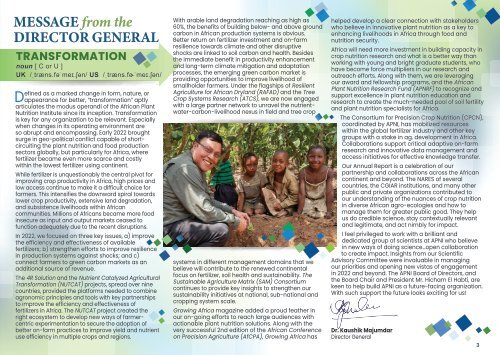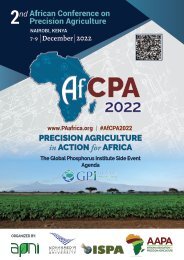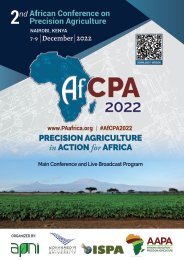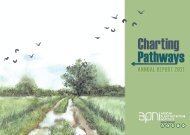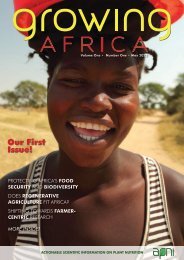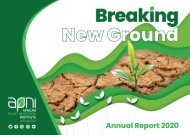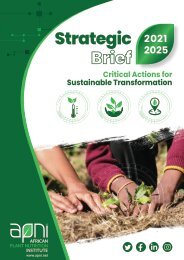APNI Annual Report 2022 - Towards Transformation
You also want an ePaper? Increase the reach of your titles
YUMPU automatically turns print PDFs into web optimized ePapers that Google loves.
MESSAGE from the<br />
DIRECTOR GENERAL<br />
TRANSFORMATION<br />
noun [ C or U ]<br />
UK /ˌtræns.fəˈmeɪ.ʃən/ US /ˌtræns.fɚˈmeɪ.ʃən/<br />
Defined as a marked change in form, nature, or<br />
appearance for better, “transformation” aptly<br />
articulates the modus operandi of the African Plant<br />
Nutrition Institute since its inception. <strong>Transformation</strong><br />
is key for any organization to be relevant. Especially<br />
when changes in its operating environment are<br />
so abrupt and encompassing. Early <strong>2022</strong> brought<br />
surge in geo-political conflict capable of shortcircuiting<br />
the plant nutrition and food production<br />
sectors globally, but particularly for Africa, where<br />
fertilizer became even more scarce and costly<br />
within the lowest fertilizer using continent.<br />
While fertilizer is unquestionably the central pivot for<br />
improving crop productivity in Africa, high prices and<br />
low access continue to make it a difficult choice for<br />
farmers. This intensifies the downward spiral towards<br />
lower crop productivity, extensive land degradation,<br />
and subsistence livelihoods within African<br />
communities. Millions of Africans became more food<br />
insecure as input and output markets ceased to<br />
function adequately due to the recent disruptions.<br />
In <strong>2022</strong>, we focused on three key issues, a) improve<br />
the efficiency and effectiveness of available<br />
fertilizers; b) strengthen efforts to improve resilience<br />
in production systems against shocks; and c)<br />
connect farmers to green carbon markets as an<br />
additional source of revenue.<br />
The 4R Solution and the Nutrient Catalyzed Agricultural<br />
<strong>Transformation</strong> (NUTCAT) projects, spread over nine<br />
countries, provided the platforms needed to combine<br />
agronomic principles and tools with key partnerships<br />
to improve the efficiency and effectiveness of<br />
fertilizers in Africa. The NUTCAT project created the<br />
right ecosystem to develop new ways of farmercentric<br />
experimentation to secure the adoption of<br />
better on-farm practices to improve yield and nutrient<br />
use efficiency in multiple crops and regions.<br />
With arable land degradation reaching as high as<br />
60%, the benefits of building below- and above ground<br />
carbon in African production systems is obvious.<br />
Better return on fertilizer investment and on-farm<br />
resilience towards climate and other disruptive<br />
shocks are linked to soil carbon and health. Besides<br />
the immediate benefit in productivity enhancement<br />
and long-term climate mitigation and adaptation<br />
processes, the emerging green carbon market is<br />
providing opportunities to improve livelihood of<br />
smallholder farmers. Under the flagships of Resilient<br />
Agriculture for African Dryland (RAFAD) and the Tree<br />
Crop Systems Research (ATCS), we are now engaged<br />
with a large partner network to unravel the nutrientwater-carbon-livelihood<br />
nexus in field and tree crop<br />
systems in different management domains that we<br />
believe will contribute to the renewed continental<br />
focus on fertilizer, soil health and sustainability. The<br />
Sustainable Agriculture Matrix (SAM) Consortium<br />
continues to provide key insights to strengthen our<br />
sustainability initiatives at national, sub-national and<br />
cropping system scale.<br />
Growing Africa magazine added a proud feather in<br />
our on-going efforts to reach large audiences with<br />
actionable plant nutrition solutions. Along with the<br />
very successful 2nd edition of the African Conference<br />
on Precision Agriculture (AfCPA), Growing Africa has<br />
helped develop a clear connection with stakeholders<br />
who believe in innovative plant nutrition as a key to<br />
enhancing livelihoods in Africa through food and<br />
nutrition security.<br />
Africa will need more investment in building capacity in<br />
crop nutrition research and what is a better way than<br />
working with young and bright graduate students, who<br />
have become force multipliers in our research and<br />
outreach efforts. Along with them, we are leveraging<br />
our award and fellowship programs, and the African<br />
Plant Nutrition Research Fund (APNRF) to recognize and<br />
support excellence in plant nutrition education and<br />
research to create the much-needed pool of soil fertility<br />
and plant nutrition specialists for Africa.<br />
The Consortium for Precision Crop Nutrition (CPCN),<br />
coordinated by <strong>APNI</strong>, has mobilized resources<br />
within the global fertilizer industry and other key<br />
groups with a stake in ag. development in Africa.<br />
Collaborations support critical adaptive on-farm<br />
research and innovative data management and<br />
access initiatives for effective knowledge transfer.<br />
Our <strong>Annual</strong> <strong>Report</strong> is a celebration of our<br />
partnership and collaborations across the African<br />
continent and beyond. The NARES of several<br />
countries, the CGIAR institutions, and many other<br />
public and private organizations contributed to<br />
our understanding of the nuances of crop nutrition<br />
in diverse African agro-ecologies and how to<br />
manage them for greater public good. They help<br />
us do credible science, stay contextually relevant<br />
and legitimate, and act nimbly for impact.<br />
I feel privileged to work with a brilliant and<br />
dedicated group of scientists at <strong>APNI</strong> who believe<br />
in new ways of doing science…open collaboration<br />
to create impact. Insights from our Scientific<br />
Advisory Committee were invaluable in managing<br />
our priorities and opening new vistas of engagement<br />
in <strong>2022</strong> and beyond. The <strong>APNI</strong> Board of Directors, and<br />
the Board Chair and President Mr. Hicham El Habti, are<br />
keen to help build <strong>APNI</strong> as a future-facing organization.<br />
With such support the future looks exciting for us!<br />
Dr. Kaushik Majumdar<br />
Director General<br />
3


